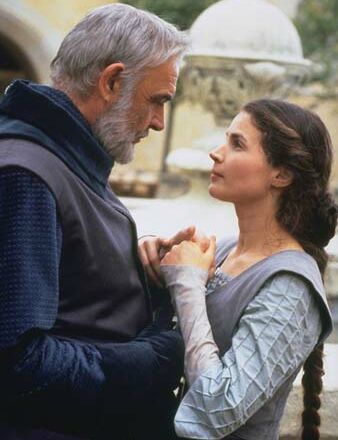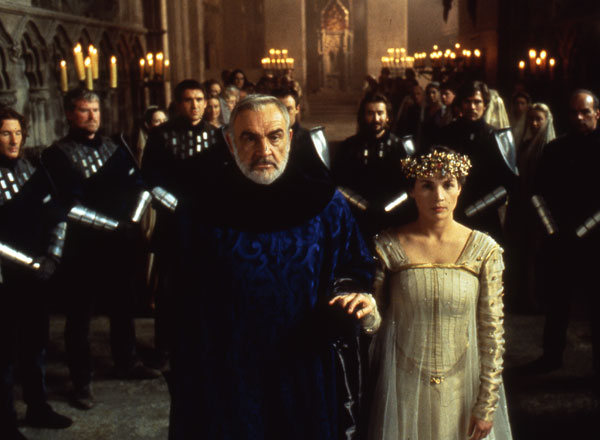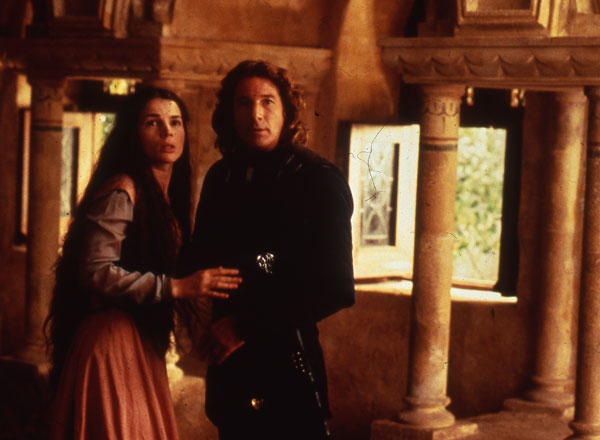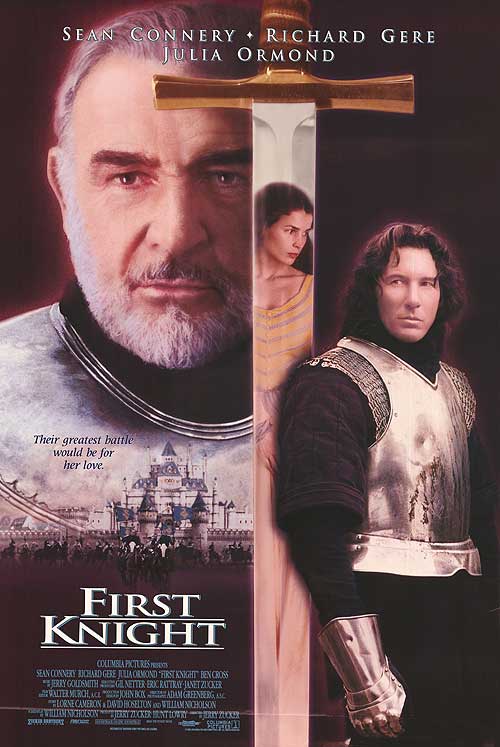First Knight
First Knight
 |
|
| Articles on First Knight |
|
|
| Plot Summary |

On the way to Camelot to meet King Arthur, her ally and future husband, Lady Guinevere and her retinue are attacked by Arthur's mortal enemy, Prince Malagant, who wants possession of Guinevere's land. Lancelot, a wandering adventurer and unparalleled swordsman, rescues her from her attackers. In return, he asks for a kiss from the lovely Lady -- a request that Guinevere coldly refuses.They meet again when Lancelot turns up at one of Camelot's public tournaments. When Malagant kidnaps Queen Guinevere from Camelot, Lancelot single handedly pursues and rescues her and finally wins her heart. Inspired by the high principles he has learned from Arthur and conscious of the impossible dilemma he has placed her in, Lancelot tells Guinevere that he has decided to leave Camelot. Unable to resist her heart’s passionate love for him, she is discovered by the king while exchanging a single kiss with Lancelot. Arthur feels angry and betrayed by his wife and trusted knight. When Malagant attacks Camelot, Arthur is killed in the act of defying him. On his death bed, he charges Lancelot with both his kingdom and his wife. |
Directed by Jerry Zucker
Screenplay by William Nicholson
Starring Sean Connery as King Arthur, Richard Gere as Lancelot, Julia Ormond as Guinevere
Copyright belongs to Columbia Pictures Corporation
- The Internet Movie Database has information related to the movie and its actors.
- Wikipedia offers all details of the story and movie First Knight.
- This site offers interesting review of this movie First Knight
Level 7 - Mental love
Real love is a pure and special vibration between people that differs from the intense longings and passions many describe by the word. It is difficult to sustain vital forms of love without strong positive encouragement from the other person, whereas mental love does not depend on reciprocity. The power of Mind arises from an organization of ideas. Mental love is based on an idealistic conception of what love is and a perception of idealized values in the other person. Mental love gives rise to unwavering loyalty. It involves a lasting commitment to the other person which does not depend on circumstances, personal contact or even the response of the other person. We can love another person as an individual only when we fully recognize and respect the ways they are unique and different from ourselves and value them for those differences rather than trying to change them or mold them into our ideal image. Mental love may lack the intense sensations of previous stages, but it brings a lightness, sweetness and refinement of feeling that is uplifting and more deeply fulfilling.
An Angelic Goodness (Gone with the Wind)
The relationship between Rhett Butler and Scarlett O’Hara is glorified in the public imagination as the quintessence of romance. But the real love story in Gone with the Wind is not between these two selfish, self-centered characters whose passion torments and ultimately ruins the happiness of both. It is rather the quiet, idealized love between Ashley and Melanie Wilkes that depicts the true qualities and power of love to nurture, save and protect, even in times of extraordinary upheaval. Scarlett has set her heart on marrying the refined and cultured Ashley. But he chooses instead his mild-mannered and frail cousin Melanie and marries her just before the outbreak of the Civil War. Then he is called to serve in the Southern army and they are separated for the duration of the war.
Melanie lacks the captivating beauty, energy, vitality, and feminine wiles of Scarlett. But her gentle heart is made of pure goodness and possesses extraordinary power of goodwill that protects Ashley through the long years of fighting and imprisonment. She combines goodness and goodwill with a capacity for total self-giving to those she loves, which makes her one of the most remarkable women in life or literature. Incapable of a selfish act, she yearns only for the well-being and happiness of her husband, family and friends. Incapable of suspicion or recriminations against anyone, she loves Scarlett even though she knows of Scarlett’s secret yearning for her husband and on her death bed urges Scarlett to care for Ashley. The suffering and destruction wrought by Civil War leave little scope for pleasure or happiness of any description, but through it all Melanie’s unshakeable loyalty and commitment to those she loves creates a cocoon of sweetness and affection which nurtures and protects. Ashley is devastated by her death. Only after her passing, does Scarlett realize the immense power of her idealized love.
A Queen’s Love (First Knight)
Can a person truly love more than one person? In the movie First Knight, Lady Guinevere is torn between her deep, idealistic admiration for the good and noble King Arthur and her passionate emotional attraction to valiant Lancelot. Her love and loyalty to her husband King are juxtaposed to the yearning of her heart and body for the knight who has twice saved her life. Her love of Arthur is the mind’s idealism which cherishes all that is true and noble. Her love of Lancelot is yearning vital-emotional passion. Though very different in nature, Guinevere’s love and loyalty to Arthur are as real and compelling as her powerful physical and vital attraction to Lancelot. A human being is capable of loving more than one person, but few have the energy and intensity to maintain it. In this case, Arthur dies so she can live out her love with Lancelot.
Learn unfailing strategies to rise up the scale of romance in your relationship
If you would like to raise general questions on romance, love, marriage and relationship or about any of the content in this article, please post your entry in the appropriate forums
Level 5 - Affection
Affection is emotional enjoyment of the other person. Affection emanates from the heart. Energy expressing in our emotional center generates intense feelings of affection. At the physical level there is an urge to hold, grasp, and possess the other person in order to derive security, comfort or pleasure from the interaction. At the emotional level there is an urge to give oneself to the other person in order to please and make the other person happy. When affection is very physical, it can be possessive and demanding. True emotional affection for another person is incapable of shouting, anger or meanness of any kind. It is only the vital ego that wants to dominate which can try to hurt the other person. The higher and purer the affection, the less the intensity of the sexual urge. At the same time physical intimacy becomes far sweeter and uplifting because the intensity comes from the pure enjoyment of one’s affection for the other person.
Frank & Mary
In Dr. Thorne, Anthony Trollope portrays the love story of Frank Gresham and Mary Thorne. Frank is the descendant of a long line of Greshams, the richest landowners in their county who had served as its representative in Parliament for many generations. His mother came from a titled and far wealthier aristocratic family. Her social and material demands were so great that Frank’s father was forced to borrow heavily on the family property and eventually to sell a large part of the estate to a self-made Sir Roger Scatherd, a millionaire businessman. Gresham’s debts to Sir Roger continued to mount, jeopardizing what remained of Frank’s inheritance. Mary Thorne was the illegitimate, adopted niece of Dr. Thorne, the Greshams’ family physician. Both Frank and Mary believed she was actually the doctor’s daughter, though Frank’s parents knew and kept the secret during years when the children grew up together as playmates. When Frank came of age he announced his intention of marrying beautiful Mary. His mother vigorously protested and sent Frank away, arguing that Frank must marry a wealthy woman in order to restore the family’s financial fortunes. In spite of her ardent love for Frank, Mary did all she could to discourage Frank from displeasing his parents. But Frank remained true and adamant in his love for her, even when he was informed that she was illegitimate as well as penniless. Frustrating all his mother’s attempts to prevent it, Frank finally declared his intention of marrying Mary. Then it was revealed by Dr. Thorne that Mary was actually the niece and heir to the deceased Roger Scatherd’s enormous fortune, which meant that she already held legal title to more than half of the Gresham property. Frank’s unwillingness to renounce his love for Mary in spite of intense social pressure and the prospect of ruin, and Mary’s unwillingness to accept his love for fear of the harm and disgrace it might bring on him and his family, reflect the depth of affection with which they loved one another. The sincerity of their feelings enabled each of them to willingly sacrifice for the good of the other. More significantly, it had the strength to fully restore Frank’s family heritage and Mary’s social legitimacy. Love has that power over life.
Inman & Ada (Cold Mountain)
When it gives rise to physical or vital attraction, love at first sight may last only as long as the partners are in physical or social contact. But when it touches the deeper emotions of the heart, even a few moments together can give birth to an affection that outlives years of separation and silence. It forms an emotional bridge of connectivity that can enable the lovers to overcome incredible obstacles to reunite. In Cold Mountain, a beautiful city-bred preacher’s daughter named Ada Monroe meets a shy, handsome woodworker named Inman in a secluded rural part of North Carolina at the outbreak of the Civil War. Though they exchange only a few formal words, their hearts respond to one another. When Inman enlists to fight for the South, they exchange photographs and a single parting kiss. After the death of her father, Ada finds herself helpless, defenseless and pursued by a local bully named Teague. Daily she voices a heart-felt prayer for Inman to return. The sins he has committed in battle make Inman feel unworthy of her love. Only partly recovered from a serious wound received in battle, he risks death for desertion and travels the long dangerous road back to Cold Mountain. At one point he is given shelter by a beautiful young woman with child, who offers herself to him. In spite of feeling a strong physical attraction for her, his longing for Ada prevents him from responding to her invitation. Inman eventually meets Ada and after she conceives with a child, he then kills Teague before being mortally wounded himself. His love was powerful enough to find her and protect her and leave her with a son to raise. The strength of their affection could achieve this much despite the extreme social turmoil and destruction of war.
Immortal Infatuation (Romeo and Juliet)
We find a similar instance of intense emotional love in Shakespeare’s Romeo and Juliet. Here too, the young lovers were separated by powerful social barriers because they came from traditionally warring families. Here too, the lovers cared only for one another and threw aside the objections of family and society. Why then did their love end in the tragedy rather than blissful fulfillment? In this case, the lovers were extremely young, very impulsive and desperately impatient. Unlike Frank and Mary, they lacked the patience and maturity to wait for circumstances to improve. Patience requires strength. Their love had intensity but no strength to wait and persevere. Impulsiveness and impatience can never serve as the basis for accomplishment in life or romance. True romance is forgetful of self. It requires sacrifice not wild, reckless or desperate demands. It is willing to give with no thought of return and regards only the happiness and fulfillment of the beloved.
Lancelot & Guinevere (First Knight)
Lady Guinevere’s escort is attacked by a powerful warlord while she is en route to Camelot to marry the noble King Arthur. Lancelot, a wandering vagabond swordsman, rescues her from the attackers. He is instantly attracted by Guinevere’s majestic beauty and noble character. She feels the powerful lure of his physical manliness and courage, but resists his sexual advances. Lancelot arrives in Camelot just in time for her wedding with Arthur. Shortly afterwards she is kidnapped by the same warlord, who wants to gain her kingdom by blackmail. Again Lancelot single-handedly saves her. His confidence, courage and willingness for self-sacrifice move her deeply and she has to struggle not to give in to the powerful emotions that draws them to one another.
Knighted for his heroic service to the crown, Lancelot remains in Camelot, secretly nurturing an all-consuming passion for the queen. Eventually he comes to accept the ideals that Arthur stands for and decides out of respect for the King and Queen to leave Camelot forever. His acceptance of noble ideals elevates him even further in her emotions. Heartbroken to be losing him forever without ever having felt the joy of his love, she offers one kiss. Arthur discovers them embracing and is furious at their treasonous betrayal. In defense she explains that her love for both men is real and true, but different. She loves and worships Arthur with her all her heart’s purity and mind’s admiration. At the same time she feels powerfully drawn toward by a physical and vital passion elevated and ennobled by a deep emotional bond of affection and self-giving. The contrast between the two relationships brings out both the most positive aspects and two very different forms of romance.
Jerry & Dorothy (Jerry Maguire)
This movie depicts the unlikely romance between a high flying, high energy sports agent and a shy, homely accountant. After Jerry writes a memo proposing that his agency he works for adopt higher ethical standards in serving their clientele, Jerry is summarily dismissed from his lucrative job. Inspired by the courage and values espoused in his memo, Dorothy is the only employee at the firm willing to stand up for principles and follow Jerry’s lead. So she quits her job and together they establish a separate company, but manage to retain only one of Jerry’s former clients. With no income and no prospects, they struggle to make ends meet. When Jerry’s glamorous girlfriend also deserts him, he is left failed and friendless. Through it all, Dorothy remains loyal and offers unstinting support. Jerry develops a fondness for Dorothy’s son from a previous marriage, has a one-night affair with Dorothy, and then overhears her telling her sister how much she loves him. Finally Dorothy senses that Jerry is only maintaining their relationship out of sense of appreciation for the support she has offered him, so she announces that she is leaving to take a job in another city. Jerry impulsively proposes to her on the spur of the moment and they marry. Again after marriage, she feels that she and her son have trapped Jerry into a relationship that does not suit him and she decides to withdraw. After months of total failure in his work, Jerry finally has a major breakthrough when his sole client achieves superstar status and signs a huge multi-year contract. Finally vindicated in the decisions he has taken, Jerry discovers that without Dorothy his success brings him no sense of fulfillment, so he rushes back to reunite with her.
Through their relationship Jerry moves from the charms of sexual and vital attraction to discover the greater richness and sweetness of lasting affection. As in the case of Mae Braddock in Cinderella Man, Dorothy’s intense goodwill and affection are a powerful support for her lover’s high achievement.
Edward & Elinor (Sense & Sensibility)
Elinor, Marianne and Margaret are daughters of Mr. Dashwood who died leaving his wife and daughters with very little means to support themselves. Elinor develops an affection for Mr. Edward Ferrars, her sister-in-law's wealthy brother, and her feelings appear to be reciprocated. Edward has been engaged for many years to Lucy Steele, whom he met in his youthful days but does not love anymore. He wants to tell Elinor about it, but he does not find a suitable opportunity. Later Elinor hears about it from Lucy herself and is heartbroken. Though Elinor and Edward harbor strong feelings of love for one another, he feels bound by his commitment to Ms. Steele. Elinor feels resigned to accept that commitment and remain an aging spinster. Then suddenly Edward receives a letter from Lucy informing him that she has fallen in love with his brother, Robert, and they have married. Edward goes to Elinor to express his true feelings and they are reunited happily in the end.
The story vividly represents the power of pure emotions, unmixed by possessiveness, impulsive attachment, egoism or assertiveness. Elinor controls and refrains from expressing her deep affection for Edward until the power of her love removes all obstacles and brings her love to her. Her love is sharply contrast to the flighty impulsive physicality of her sister Marianne, described in Level 2.
Learn unfailing strategies to rise up the scale of romance in your relationship
If you would like to raise general questions on romance, love, marriage and relationship or about any of the content in this article, please post your entry in the appropriate forums



 Lancelot & Guinevere are an example of Affection Level 5 on the Scale of Romance.
Lancelot & Guinevere are an example of Affection Level 5 on the Scale of Romance. 
